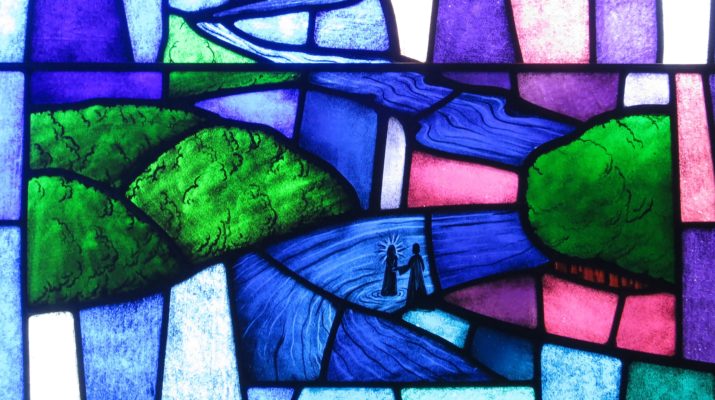Acts 19:1-7
Baptism of the Lord B7
1 AWhile ApollosB was in Corinth,C
A {untranslated} = ginomai. This is to come into being, to happen, become, be born. It can be to emerge from one state or condition to another or is coming into being with the sense of movement or growth.
B “Apollos” = Apollos. 10x in NT. Probably from Apollonios (belonging to Apollo); from the same as apollonia (Apollonia, a Macedonian city); from Apollon (the Greek god Apollo, who was god of “light, music, medicine, poetry, prophecy, dance, manly beauty”); possibly from Pre-Greek (to drive away) OR from Greek apollumi (to destroy) OR apolouon (washing) OR apoluon (delivering) OR haploun (simple) OR aeiballon (always shooting) OR a (not) + polus (parts). This is Apollos. See https://en.wiktionary.org/wiki/Apollo
C “Corinth” = Korinthos. 6x in NT. From “Pre-Greek Pelasgian kar (point, peak); perhaps named after Corinthos, a descendant of the god Zeus.” This is Corinth. See https://en.wiktionary.org/wiki/%CE%9A%CF%8C%CF%81%CE%B9%CE%BD%CE%B8%CE%BF%CF%82#Ancient_Greek & https://en.wikipedia.org/wiki/Ancient_Corinth
PaulD passed throughE the interiorF regionsG
D “Paul” = Paulos. From Latin Paulus (small, little). This is Paul or Paulos, meaning little.
E “passed through” = dierchomai. From dia (through, across to the other side, thoroughly) + erchomai (to come, go). This is to go through, come, depart, pierce, travel, traverse.
F “interior” = anoterikos. 1x in NT. From anoteros (higher, above, to the top; place of greater honor; earlier in a book); from ano (up, above, up to the top, things above, heaven); from ana (up, upwards, again, back, among, anew). This is upper, inland, higher up.
G “regions” = meros. This is a part, a share, or a portion.
and cameH to Ephesus,I where he foundJ some disciples.K
H “came” = erchomai. Related to “passed through” in v1. See note E above.
I “Ephesus” = Ephesos. 16x in NT. Perhaps from Luwian Apa-ša (“later-city”) OR from Hittite Apasa (capital of Arzawa – an allied group in western Anatolia); {from appa (behind, back, after)}. This is Ephesus, meaning the “later place,” which would perhaps have the sense of a city named Newtown or Lands End. See https://en.wiktionary.org/wiki/%E1%BnC%9C%CF%86%CE%B5%CF%83%CE%BF%CF%82#Ancient_Greek & https://www.abarim-publications.com/Meaning/Ephesus.html#.XsrG5WhKhPY
J “found” = heurisko. This is to find, learn, or obtain. It is to discover something, which generally implies a period of searching for it. This is to find in a literal or figurative sense. This is where the word “heuristic” comes from.
K “disciples” = mathetes. From matheteuo (to make a disciple of); from manthano (to learn key facts, gain knowledge from experience; generally implies reflection as part of the learning process); from math– (thinking things through). This is a disciple, learner, or student. It is where we get “mathematics” from.
2 He said to them, “Did you receiveL the HolyM SpiritN when you became believers?”O
They replied, “No, we have not even heardP that there is a Holy Spirit.”
L “receive” = lambano. It does not refer to passive receiving of something, but active acceptance or taking of something whether it is offered or simply nearby. It focuses on individual decision and action.
M “Holy” = hagios. From hagnos (holy, sacred, pure ethically, ritually, or ceremonially; prepared for worship, chaste, unadulterated, pure to the core; undefiled by sin; figurative for innocent, modest, perfect). God is totally different from humanity and thus set apart. That which is consecrated to worship God (elements of worship) or to serve God (as the saints) are holy because they are now set apart for God’s purposes. Holy because important to God. This is sacred physically, pure. It can be morally blameless or ceremonially consecrated.
N “Spirit” = pneuma. From pneo (to blow, breath, breathe hard). This is wind, breath, or ghost. A breeze or a blast or air, a breath. Figuratively used for a spirit, the human soul or part of us that is rational. It is also used supernaturally for angels, demons, God, and the Holy Spirit. This is where pneumonia comes from.
O “became believers” = pisteuo. From pistis (faith, faithfulness, belief, trust, confidence; to be persuaded or come to trust); from peitho (to have confidence, urge, be persuaded, agree, assure, believe, have confidence, trust). This is to believe, entrust, have faith it, affirm, have confidence in. This is less to do with a series of beliefs or doctrines that one believes and more to do with faithfulness, loyalty, and fidelity. It is trusting and then acting based on that trust.
P “heard” = akouo. This is hear or listen, but it also means to understand by hearing. This is where the word “acoustics” comes from.
3 Then he said, “Into what then were you baptized?”Q
They answered, “Into John’sR baptism.” S
Q “baptized” = baptizo. From bapto (to dip or dye; to entirely cover with liquid, to stain). This is to submerge, wash, or immerse. Used specially for baptism.
R “John’s” = Ioannes. From Hebrew yochanan (Johanan); from Yehochanan (“the Lord has been gracious”); {from YHVH (proper name of the God of Israel); {from havah (to become); from hayah (to be, exist, happen)} + chanan (beseech, show favor, be gracious; properly, to bend in kindness to someone with less status). This is John.
S “baptism” = baptisma. Related to “baptized” in v3. From baptizo (see note Q above). This is dipping or sinking. Also, the rite of baptism.
4 Paul said, “John baptized with the baptism of repentance,T telling the peopleU to believeV in the one who was to come after him, that is, in Jesus.”W
T “repentance” = metanoia. From meta (with, among, after, beyond) + noieo (to perceive, think, understand); {from nous (mind, understanding, reasoning faculty, intellect, capacity to reflect)}. This is literally to change one’s mind – to choose to think differently and so to act differently because of a moral compunction. It is an intentional change to the inner self. This word shares a root with the English “paranoia.”
U “people” = laos. This is the people or crowd – often used for the chosen people. This is where the word “laity” comes from.
V “believe” = pisteuo. Same as “became believers” in v2. See note O above.
W “Jesus” = Iesous. Related to “John’s” in v3. From Hebrew Yehoshua (Joshua, the Lord is salvation); {from YHVH (see note R above) + yasha (to deliver, defend, help, preserve, rescue; properly, to be open, wide or free, which implies being safe. So, in a causative sense, this is to free someone)}. This is Jesus or Joshua in Greek – the Lord saves or the Lord is salvation.
5 On hearing this, they were baptized in the nameX of the LordY Jesus. 6 When Paul had laidZ his handsAA on them,
X “name” = onoma. May be from ginosko (know, recognize, learn from firsthand experience). This is a name, authority, cause, character, fame, reputation. The name was thought to include something of the essence of the person so it was not thought to be separate from the person.
Y “Lord” = kurios. From kuros (authority, supremacy). This is a respectful address meaning master or sir. It refers to one who has control or power greater than one’s own. So, it was also applied to God and Jesus as Master or Lord.
Z “laid” = epitithemi. From epi (on, upon, what is fitting) + tithemi (to put, place, set, fix, establish in a literal or figurative sense; properly, this is placing something in a passive or horizontal position). This is to lay on or place on, whether in a friendly or aggressive way.
AA “hands” = cheir. This is the hand in a literal sense. Figuratively, the hand is the means a person uses to accomplish things so it can also mean power, means, or instrument.
the Holy Spirit came upon them, and they spoke in tonguesBB and prophesiedCC— 7 altogether there were about twelve of them.DD
BB “tongues” = glossa. Root refers to a point that sticks out. This is tongue in a literal sense, but can also refer to language or a nation that speaks a different language. Figuratively, it can also refer to speaking in tongues or speech inspired by the Spirit.
CC “prophesied” = propheteuo. From prophetes (prophet or poet; one who speaks with inspiration from God); {from pro (before, in front of, earlier than) + phemi (to declare, say, use contrasts in speaking to shed light on one point of view); {from phao (to shine) or phaino (to bring light, cause to appear, shine, become visible or clear)}}. This is to prophesy, foretell, or tell forth.
DD “them” = aner. This is man, male, husband, or fellow. It can also refer to an individual.
Image credit: “Baptism” window at Saint James the Greater Catholic Church in Concord, North Carolina.



